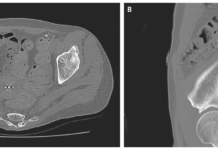Penile metastases
Penile metastases because of invasive bladder cancer is very rare. It has only 217 cases that have been recorded globally, based on a comprehensive literature review. However, the clinical presentation of disease is linked with poor prognosis, with a life expectancy of less than 1 year. This article describes the case of a 91-year-old man who presented with penile metastases a month after diagnosis of metastatic bladder cancer.
Examination showed a raised, erythematous and painful lesion on his glans penis. Doctors initially admitted him for pain relief. There was no history of discharge, haematuria, trauma or malignant neoplasms. Closer examination showed an additional, painless and firm nodule palpable along the penile shaft. Doctors performed a penile ultrasound which confirmed the presence of “a solid mass with internal vascularity consistent with metastatic disease with further soft tissue deposits along the penile shaft”.

The patient was advised conservative treatment, given his age and comorbidities.
Conservative treatment was considered as the most appropriate, given his age and comorbidities. Therefore, the doctors did not pursue any further investigations or sampling, for example, penile MRI and histopathology. When the patient’s previous CT scans were reviewed the tumour was seen to be “invading the posterior peri-vesical fat to abut the internal iliac artery”. The radiological evidence was suggestive of a haematogenous spread.
The authors of the study further write that this is a particularly interesting case because of several reasons. First, the old man was almost three decades more than the mean age of presentation of disease. Similarly, the lesion was both painful and affected the glans penis. The two features are relatively atypical for penile metastases.
The purpose of this case study is to raise awareness of penile metastases for earlier detection and better prognosis. In a few cases a total panectomy with chemotherapy and radiotherapy has shown conservative success. Whereas symptom relief generally revolves around radical ablative surgery.
References
Isolated penile metastases secondary to invasive bladder cancer https://casereports.bmj.com/content/14/5/e243673




